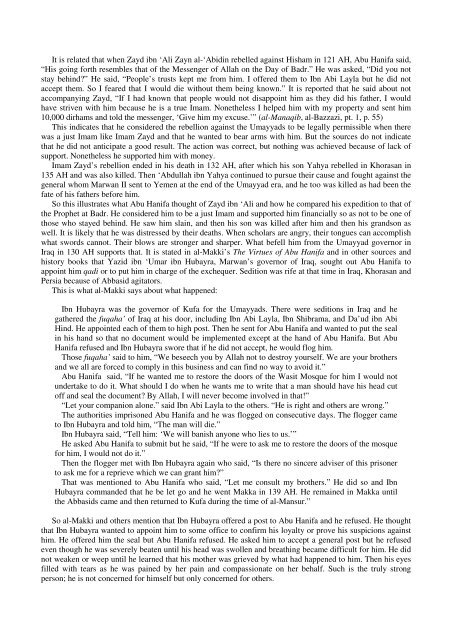Create successful ePaper yourself
Turn your PDF publications into a flip-book with our unique Google optimized e-Paper software.
It is related that when Zayd ibn ‘Ali Zayn al-‘Abidin rebelled against <strong>His</strong>ham in 121 AH, <strong>Abu</strong> <strong>Hanifa</strong> said,<br />
“<strong>His</strong> going forth resembles that of the Messenger of Allah on the Day of Badr.” He was asked, “Did you not<br />
stay behind?” He said, “People’s trusts kept me from him. I offered them to Ibn Abi Layla but he did not<br />
accept them. So I feared that I would die without them being known.” It is reported that he said about not<br />
accompanying Zayd, “If I had known that people would not disappoint him as they did his father, I would<br />
have striven with him because he is a true <strong>Imam</strong>. Nonetheless I helped him with my property <strong>and</strong> sent him<br />
10,000 dirhams <strong>and</strong> told the messenger, ‘Give him my excuse.’” (al-Manaqib, al-Bazzazi, pt. 1, p. 55)<br />
This indicates that he considered the rebellion against the Umayyads to be legally permissible when there<br />
was a just <strong>Imam</strong> like <strong>Imam</strong> Zayd <strong>and</strong> that he wanted to bear arms with him. But the sources do not indicate<br />
that he did not anticipate a good result. The action was correct, but nothing was achieved because of lack of<br />
support. Nonetheless he supported him with money.<br />
<strong>Imam</strong> Zayd’s rebellion ended in his death in 132 AH, after which his son Yahya rebelled in Khorasan in<br />
135 AH <strong>and</strong> was also killed. Then ‘Abdullah ibn Yahya continued to pursue their cause <strong>and</strong> fought against the<br />
general whom Marwan II sent to Yemen at the end of the Umayyad era, <strong>and</strong> he too was killed as had been the<br />
fate of his fathers before him.<br />
So this illustrates what <strong>Abu</strong> <strong>Hanifa</strong> thought of Zayd ibn ‘Ali <strong>and</strong> how he compared his expedition to that of<br />
the Prophet at Badr. He considered him to be a just <strong>Imam</strong> <strong>and</strong> supported him financially so as not to be one of<br />
those who stayed behind. He saw him slain, <strong>and</strong> then his son was killed after him <strong>and</strong> then his gr<strong>and</strong>son as<br />
well. It is likely that he was distressed by their deaths. When scholars are angry, their tongues can accomplish<br />
what swords cannot. Their blows are stronger <strong>and</strong> sharper. What befell him from the Umayyad governor in<br />
Iraq in 130 AH supports that. It is stated in al-Makki’s The Virtues of <strong>Abu</strong> <strong>Hanifa</strong> <strong>and</strong> in other sources <strong>and</strong><br />
history books that Yazid ibn ‘Umar ibn Hubayra, Marwan’s governor of Iraq, sought out <strong>Abu</strong> <strong>Hanifa</strong> to<br />
appoint him qadi or to put him in charge of the exchequer. Sedition was rife at that time in Iraq, Khorasan <strong>and</strong><br />
Persia because of Abbasid agitators.<br />
This is what al-Makki says about what happened:<br />
Ibn Hubayra was the governor of Kufa for the Umayyads. There were seditions in Iraq <strong>and</strong> he<br />
gathered the fuqaha’ of Iraq at his door, including Ibn Abi Layla, Ibn Shibrama, <strong>and</strong> Da’ud ibn Abi<br />
Hind. He appointed each of them to high post. Then he sent for <strong>Abu</strong> <strong>Hanifa</strong> <strong>and</strong> wanted to put the seal<br />
in his h<strong>and</strong> so that no document would be implemented except at the h<strong>and</strong> of <strong>Abu</strong> <strong>Hanifa</strong>. But <strong>Abu</strong><br />
<strong>Hanifa</strong> refused <strong>and</strong> Ibn Hubayra swore that if he did not accept, he would flog him.<br />
Those fuqaha’ said to him, “We beseech you by Allah not to destroy yourself. We are your brothers<br />
<strong>and</strong> we all are forced to comply in this business <strong>and</strong> can find no way to avoid it.”<br />
<strong>Abu</strong> <strong>Hanifa</strong> said, “If he wanted me to restore the doors of the Wasit Mosque for him I would not<br />
undertake to do it. What should I do when he wants me to write that a man should have his head cut<br />
off <strong>and</strong> seal the document? By Allah, I will never become involved in that!”<br />
“Let your companion alone.” said Ibn Abi Layla to the others. “He is right <strong>and</strong> others are wrong.”<br />
The authorities imprisoned <strong>Abu</strong> <strong>Hanifa</strong> <strong>and</strong> he was flogged on consecutive days. The flogger came<br />
to Ibn Hubayra <strong>and</strong> told him, “The man will die.”<br />
Ibn Hubayra said, “Tell him: ‘We will banish anyone who lies to us.’”<br />
He asked <strong>Abu</strong> <strong>Hanifa</strong> to submit but he said, “If he were to ask me to restore the doors of the mosque<br />
for him, I would not do it.”<br />
Then the flogger met with Ibn Hubayra again who said, “Is there no sincere adviser of this prisoner<br />
to ask me for a reprieve which we can grant him?”<br />
That was mentioned to <strong>Abu</strong> <strong>Hanifa</strong> who said, “Let me consult my brothers.” He did so <strong>and</strong> Ibn<br />
Hubayra comm<strong>and</strong>ed that he be let go <strong>and</strong> he went Makka in 139 AH. He remained in Makka until<br />
the Abbasids came <strong>and</strong> then returned to Kufa during the time of al-Mansur.”<br />
So al-Makki <strong>and</strong> others mention that Ibn Hubayra offered a post to <strong>Abu</strong> <strong>Hanifa</strong> <strong>and</strong> he refused. He thought<br />
that Ibn Hubayra wanted to appoint him to some office to confirm his loyalty or prove his suspicions against<br />
him. He offered him the seal but <strong>Abu</strong> <strong>Hanifa</strong> refused. He asked him to accept a general post but he refused<br />
even though he was severely beaten until his head was swollen <strong>and</strong> breathing became difficult for him. He did<br />
not weaken or weep until he learned that his mother was grieved by what had happened to him. Then his eyes<br />
filled with tears as he was pained by her pain <strong>and</strong> compassionate on her behalf. Such is the truly strong<br />
person; he is not concerned for himself but only concerned for others.














